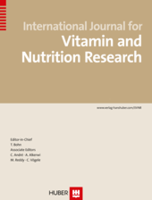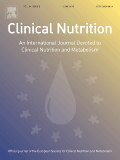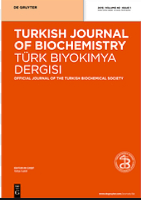
TRACE ELEMENTS AND ELECTROLYTES
Scope & Guideline
Connecting Research with Health Insights
Introduction
Aims and Scopes
- Trace Element Biochemistry:
The journal publishes research exploring the biochemical roles of trace elements like magnesium, selenium, and zinc, examining their influence on metabolic pathways and health outcomes. - Electrolyte Homeostasis:
It focuses on the regulation and balance of electrolytes in biological systems, investigating how imbalances affect health, particularly in conditions like hypertension, diabetes, and metabolic syndrome. - Nutritional Studies:
Research is conducted on the nutritional adequacy of various diets and food products in relation to trace elements and electrolytes, assessing their impact on health and disease. - Clinical Studies and Trials:
The journal features clinical research, including trials on supplementation and dietary interventions aimed at correcting deficiencies or imbalances of trace elements and electrolytes. - Pathophysiology and Disease Associations:
It investigates the associations between trace elements, electrolytes, and various diseases, providing insights into how these elements may contribute to disease mechanisms and progression. - Public Health and Epidemiology:
The journal addresses public health issues related to trace elements and electrolytes, including population studies and the implications of deficiencies or excesses on community health.
Trending and Emerging
- Impact of COVID-19 on Trace Element Levels:
There is a notable increase in studies examining how COVID-19 affects trace element levels and electrolyte balance, highlighting the pandemic's influence on health and nutrition. - Role of Magnesium in Metabolic Health:
Research focused on magnesium's role in metabolic disorders, particularly its effects on glucose metabolism and diabetes management, has gained prominence, reflecting a growing recognition of its importance in health. - Trace Elements in Mental Health:
Emerging themes include the investigation of trace elements like magnesium and their potential roles in mental health and mood disorders, suggesting a new frontier in understanding how nutrition impacts psychological well-being. - Nutritional Interventions for Chronic Diseases:
There is an increasing trend towards exploring dietary interventions and supplementation strategies aimed at preventing or managing chronic diseases through optimizing trace element intake. - Epidemiological Studies on Trace Elements:
An upsurge in epidemiological studies assessing trace element status in various populations is evident, emphasizing the need for public health strategies to address deficiencies and imbalances.
Declining or Waning
- Heavy Metals and Toxicology:
Research on heavy metals and their toxic effects has been less prominent in recent publications, indicating a potential shift towards more nutritional and therapeutic aspects of trace elements. - Historical Perspectives on Trace Element Exposure:
Studies focusing on historical cases of trace element exposure, such as ancient poisoning incidents, seem to be declining, suggesting a move towards contemporary issues in trace element research. - Basic Mechanistic Studies:
There appears to be a waning interest in purely mechanistic studies of trace elements without clinical or nutritional context, as the journal increasingly emphasizes applied research and clinical relevance.
Similar Journals

JOURNAL OF PHYSIOLOGY AND BIOCHEMISTRY
Exploring the Synergy of Life SciencesJOURNAL OF PHYSIOLOGY AND BIOCHEMISTRY, published by Springer in the Netherlands, serves as a pivotal platform for disseminating high-quality research within the fields of physiology, biochemistry, and related biomedical sciences. With an impressive impact factor reflected in its categorization as Q2 in Biochemistry and Q1 in Medicine (miscellaneous), this journal fosters a vibrant community of scholars dedicated to advancing knowledge and innovation. The journal’s broad scope encompasses a wide range of topics from cellular mechanisms to systemic physiology, making it relevant for both theoretical and applied sciences. Researchers and practitioners are encouraged to utilize the available Open Access options to reach a wider audience. The journal’s continuous contribution to the scientific dialogue since its inception in 1996 positions it as a key resource for professionals and students alike, facilitating the exploration of cutting-edge topics and collaborative research opportunities.

INTERNATIONAL JOURNAL FOR VITAMIN AND NUTRITION RESEARCH
Pioneering insights into nutrition and metabolic health.INTERNATIONAL JOURNAL FOR VITAMIN AND NUTRITION RESEARCH, published by HOGREFE AG-HOGREFE AG SUISSE, stands as a pivotal resource in the intersecting realms of nutrition and health. With a rich publication history spanning from 1971 to 2024, this esteemed journal provides a platform for innovative research in the fields of Endocrinology, Diabetes and Metabolism, Medicine (miscellaneous), and Nutrition and Dietetics. The journal holds a respectable Q3 category ranking in these disciplines for 2023, attesting to its influence within the academic community. Although it does not offer open access, the ISSN 0300-9831 and E-ISSN 1664-2821 identifiers ensure its broad accessibility. Researchers, practitioners, and students alike benefit from its rigorous peer-reviewed content, which greatly contributes to the advancement of knowledge and best practices in nutrition research. The journal's commitment to excellence is further exemplified by its notable rankings in Scopus, where it achieves impressive standings across relevant categories. For anyone involved in the exploration of vitamins, nutrition, and their crucial roles in human health, this journal is an essential tool for staying informed and engaged with the latest scientific developments.

CLINICAL NUTRITION
Fostering Collaboration for Enhanced Nutritional StrategiesCLINICAL NUTRITION, published by Churchill Livingstone, is a premier international journal dedicated to advancing the field of nutrition and dietetics, as well as critical care and intensive care medicine. Established in 1982, the journal has consistently delivered high-quality, peer-reviewed research, celebrated for its impact with an impressive Q1 ranking in both Critical Care and Intensive Care Medicine and Nutrition and Dietetics categories as of 2023. With its emphasis on collaborative discourse among researchers, clinicians, and educators, CLINICAL NUTRITION plays a crucial role in shaping dietary practices and interventions that enhance patient care and recovery. Although the journal does not provide open access, its rigorously curated content remains a vital resource for professionals seeking to implement evidence-based nutrition strategies in clinical settings. The journal is situated in the United States, with operations based out of Edinburgh, Scotland. Researchers are encouraged to engage with this influential publication to stay abreast of the latest findings and innovations within these intersecting fields.

Turkish Journal of Biochemistry-Turk Biyokimya Dergisi
Empowering researchers with cutting-edge biochemical discoveries.Turkish Journal of Biochemistry-Turk Biyokimya Dergisi, published by WALTER DE GRUYTER GMBH, is a pivotal open-access journal in the field of biochemistry that serves as a forum for innovative research and scholarly discourse. Since its inception in 2009 and transitioning to open access in 2015, this journal has gained recognition within the scientific community, reflecting a commitment to advancing knowledge in biochemistry and related medical sciences. With a diverse scope that encompasses molecular biology, clinical biochemistry, and the broader arena of biochemical studies, Turkish Journal of Biochemistry offers researchers, professionals, and students access to impactful studies and current developments. Although currently positioned in the lower quartiles in specific categories, the journal aims to enhance its visibility and engagement as it converges towards a promising future, fostering collaboration and knowledge exchange among biochemists across Turkey and around the globe. This journal is vital for anyone seeking to stay abreast of emerging trends and research findings in biochemistry.

JOURNAL OF NUTRITIONAL SCIENCE AND VITAMINOLOGY
Illuminating the Path to Nutritional ExcellenceJOURNAL OF NUTRITIONAL SCIENCE AND VITAMINOLOGY, published by the CENTER ACADEMIC PUBL JAPAN, serves as a vital platform for scientific inquiry into the fields of nutrition and vitaminology. Established in 1973, this peer-reviewed journal not only focuses on the biochemical aspects of nutrition but also addresses broader implications on health and disease prevention. With an ISSN of 0301-4800 and an E-ISSN of 1881-7742, it provides researchers, health professionals, and students access to novel studies and reviews that advance understanding in nutritional science. Though currently not an open access journal, it maintains a respectable position in academia, with a 2023 Quartile Q3 ranking in both Medicine (miscellaneous) and Nutrition and Dietetics, and Scopus rankings reflecting its growing influence. As the journal converges towards 2024, it remains committed to enlightening its audience on the latest research developments and fostering discourse within this essential scientific community.

Nutrition & Metabolism
Unlocking the Secrets of Metabolism and NutritionNutrition & Metabolism, published by BMC, is a leading open-access journal that has been pivotal in advancing research within the domains of nutrition, metabolic science, and endocrinology since its inception in 2004. With an impressive impact in its field, this journal boasts classification in the Q1 category in both Nutrition and Dietetics and Medicine (miscellaneous), as well as Q2 in Endocrinology, Diabetes and Metabolism for 2023. It ranks in the top percentiles of its Scopus categories, highlighting its significance to the scholarly community, with notable placements such as rank 22 out of 140 in Nutrition and Dietetics. The journal's commitment to open access ensures that groundbreaking research is readily available to researchers, practitioners, and students alike, fostering collaboration and innovation across disciplines. Based in the United Kingdom, Nutrition & Metabolism continues to shape the future of nutritional science and metabolic studies, inviting submissions that address pivotal questions and drive the field forward.

Frontiers in Nutrition
Connecting research and application in the field of nutrition.Frontiers in Nutrition, published by FRONTIERS MEDIA SA, is a leading open access journal dedicated to advancing the field of nutrition through rigorous research and innovative insights. Since its inception in 2014, it has established itself as a key resource for researchers, healthcare professionals, and policymakers interested in the multidimensional aspects of nutrition and its impact on health and disease. The journal boasts a commendable reputation with a quartile ranking of Q1 in Food Science and multiple Q2 rankings in Endocrinology, Diabetes and Metabolism, as well as Nutrition and Dietetics, reflecting its high-quality contributions to the scientific community. With an accessible platform that ensures the wide dissemination of knowledge, Frontiers in Nutrition is committed to fostering collaboration among experts and promoting findings that can lead to healthier populations worldwide. The journal encourages submissions that address the complex interplay between nutrition and health, thus bridging the gap between research and practical application. Join us in exploring how nutrition can enhance well-being and address global health challenges.

BIOFACTORS
Championing High-Impact Research in Life SciencesBIOFACTORS, an esteemed journal published by Wiley, serves as a pivotal resource in the fields of Biochemistry, Clinical Biochemistry, and Molecular Medicine. With ISSN 0951-6433 and E-ISSN 1872-8081, the journal has established its reputation since its inception in 1988, showcasing a rich history of scientific inquiry and innovation. Recognized for its high academic standards, it currently holds a Q1 ranking in key categories, including Biochemistry and Medicine (miscellaneous), and ranks in the top 10% for Clinical Biochemistry according to Scopus metrics, reflecting its impact and influence in the scientific community. Although it does not offer Open Access, BIOFACTORS provides researchers the opportunity to publish and disseminate high-quality studies that advance our understanding of biological factors and their clinical implications. The journal actively encourages contributions that bridge the gap between laboratory findings and clinical applications, making it a vital platform for both seasoned researchers and emerging scholars in the life sciences.

Journal of the American Nutrition Association
Elevating the Standards of Nutrition ScienceJournal of the American Nutrition Association is a premier scholarly outlet dedicated to advancing the field of nutrition science. Published by ROUTLEDGE JOURNALS, TAYLOR & FRANCIS LTD, this journal aims to disseminate high-quality research that addresses the complexities of diet, health, and nutrition in various populations. With a robust impact factor demonstrating its significance in the realm of Medicine and Nutrition, it holds notable ranks in both the Medicine (miscellaneous) and Nutrition and Dietetics categories within Scopus. The journal supports a vision of expanding access to vital nutrition research through its open-access options, enhancing the visibility and impact of published works. As it continues to evolve from 2022 to 2024, the Journal of the American Nutrition Association stands as an invaluable resource for researchers, health professionals, and students keen on contributing to and staying informed about the latest advancements in nutrition science.

Indonesian Biomedical Journal
Shaping Tomorrow's Medicine Through Rigorous ResearchIndonesian Biomedical Journal, published by PRODIA EDUCATION & RESEARCH INST, serves as a vital platform for the dissemination of groundbreaking research in the fields of biochemistry, genetics, and molecular biology, as well as general medicine. Since its inception, this Open Access journal has made significant strides in enhancing accessibility to scientific knowledge, allowing researchers, professionals, and students to engage with high-quality studies without financial barriers. With an ISSN of 2355-9179 and a focus on emerging biomedical topics, the journal has established itself in the academic community, securing Q3 and Q4 rankings in its respective categories for 2023. The journal's commitment to maintaining a rigorous peer-review process ensures that only the most innovative and impactful research is published, fostering an environment that encourages collaborative learning and discovery. As it converges from 2017 to 2024, the Indonesian Biomedical Journal continues to be an essential resource for those involved in advancing biomedical sciences, particularly within the unique context of Indonesia and beyond.